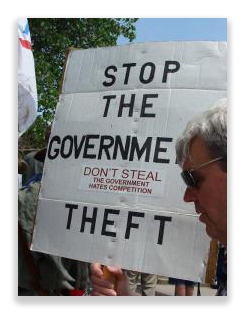We post news and comment on federal criminal justice issues, focused primarily on trial and post-conviction matters, legislative initiatives, and sentencing issues.

VICTIM BASHING
A verity beyond peradventure is the notion that a thief should return that which he or she stole to the victims. It’s not punishment: if it were, there would hardly be a legal deterrence to theft. But punishment alone, which exacts a penalty that vindicates the rights of society, does not vindicate the rights of the victims. People who have stuff taken from them ought to get it back.
 Federal law pays lip service to this notion in the Mandatory Victims Restitution Act, which requires a district court to order restitution of the property stolen or defrauded or otherwise taken from a victim. Ponzi schemers are ordered to pay back their victims, bank robbers are ordered to repay the banks, tax cheats have to pony up to the government. And under a separate statute, 18 USC 2259, children who have been the victims of child porn have been found to be entitled to compensation from defendants who happened to have their pictures in their computers, despite the fact that the defendants acquired the pictures from the Internet with no idea who the victim was.
Federal law pays lip service to this notion in the Mandatory Victims Restitution Act, which requires a district court to order restitution of the property stolen or defrauded or otherwise taken from a victim. Ponzi schemers are ordered to pay back their victims, bank robbers are ordered to repay the banks, tax cheats have to pony up to the government. And under a separate statute, 18 USC 2259, children who have been the victims of child porn have been found to be entitled to compensation from defendants who happened to have their pictures in their computers, despite the fact that the defendants acquired the pictures from the Internet with no idea who the victim was.
But here’s the rub. The law says that property acquired through crime does not ever belong to the person to acquired it criminally. At common law this was fine, because title stayed with the lawful owner. But trust Congress to (greedily) mess things up: under 18 USC 981 (and a host of other statutes), stolen property is forfeited to the government.
So Conrad Conman beats 50 investors out of $1 million in his fraud scheme. Unlike every other fraudster out there, Conrad happens to live frugally on earnings from his day job as a bilge pump operator, so the $1 million he stole remains intact, stuffed under his mattress.
When the Feds bust him, the civil forfeiture statute permits the government to seize the $1 million. That money becomes federal property. The victims, all of whom would like their money back are left with nothing but the warm contentment of knowing that the million will be spent prudently and constructively by Uncle Sam.
 The district court will sentence Conrad to 10 years, and order him to pay the victims back from his bilge pump operator’s salary. After he does his time, the U.S. Attorney’s Office Financial Litigation Unit – an understaffed and read-headed stepchild desk at the USAO – will take over collecting restitution. It’s little wonder that as of the end 2014, the FLUs nationwide had simply thrown up their collective hands, declaring a whopping 93% of the $78 billion owed to victims as uncollectible. Every dime of that is money the victims will never see again.
The district court will sentence Conrad to 10 years, and order him to pay the victims back from his bilge pump operator’s salary. After he does his time, the U.S. Attorney’s Office Financial Litigation Unit – an understaffed and read-headed stepchild desk at the USAO – will take over collecting restitution. It’s little wonder that as of the end 2014, the FLUs nationwide had simply thrown up their collective hands, declaring a whopping 93% of the $78 billion owed to victims as uncollectible. Every dime of that is money the victims will never see again.
So Conrad bilked the investors, and the government rides into the sunset with their money. Moral: if you’re going to be a thief, be a government.
All of which brings us to today’s case. Christine Bodouva was a financial officer for an architectural firm. She made off with about $127,000 that employees had contributed to the office 401(k) plan. After she was caught, she repaid every dime to the bilked employees before her sentencing.
But at sentencing, the district court ordered her to forfeit the $127,000 she had stolen to the government. She said, “What $127,000? I paid it back.” The district judge said she had no authority to offset the forfeiture against the restitution already paid, and ordered Chris to forfeit the $127,000 she no longer had to the government anyway.
Last week, the 2nd Circuit agreed, holding that “restitution and forfeiture are authorized by different statutes and serve different purposes — one of remediating a loss, the other of disgorging a gain.” The Circuit noted that restitution and forfeiture are creations of two distinct statutes, and “nothing in the statutory scheme permitted the district court to reduce the mandated criminal forfeiture order because the defendant also had to satisfy her obligation to pay restitution or had already substantially done so.”
To be sure, Chris’s victims were luckier than most, because they ended up in line ahead of Uncle Sam. They were made whole. At the same time, Chris was no worse off than if she had forfeited the $127,000 she paid back to the victims, because under the MVRA, she would have had to pay the victims restitution anyway.
 We respectfully disagree with the Circuit’s observation that “criminal forfeiture is a form of punishment. As such, it is distinct from restitution or other remedial actions, which are intended to return the victim and the perpetrator to the status quo that existed before the violation took place.” Christine’s sentence – a year and a day – was a punishment. The fine of $5,000 levied by her district judge is a form of punishment. The forfeiture, however, was done civilly in this case, making the observation that it, too, is punishment harder to accept. Even the language of the Judgment is questionable: the Court ordered Christine to “forfeit the Defendant’s interest” in the money to the government. But a defendant has no interest in stolen property: rather, it remains the property of the people from which it was stolen.
We respectfully disagree with the Circuit’s observation that “criminal forfeiture is a form of punishment. As such, it is distinct from restitution or other remedial actions, which are intended to return the victim and the perpetrator to the status quo that existed before the violation took place.” Christine’s sentence – a year and a day – was a punishment. The fine of $5,000 levied by her district judge is a form of punishment. The forfeiture, however, was done civilly in this case, making the observation that it, too, is punishment harder to accept. Even the language of the Judgment is questionable: the Court ordered Christine to “forfeit the Defendant’s interest” in the money to the government. But a defendant has no interest in stolen property: rather, it remains the property of the people from which it was stolen.
Bluntly put, a forfeiture is less of a “punishment” than it is a statutorily authorized government theft of that which has already been stolen. Were it otherwise, the government would see to it that victims were compensated first, and then the forfeiture applied later.
United States v. Bodouva, Case No. 16-3937 (2nd Cir. Mar. 22, 2017)
– Thomas L. Root

